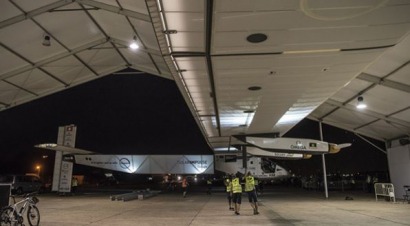
The flight -- the last leg of an epic global journey -- was postponed last Saturday due to pilot Bertrand Piccard’s sickness and worsening conditions in Cairo, as winds were too strong for the solar-powered airplane to be taken out of its tent.
The Monaco-based Mission Control Center identified Sunday at 1:00 AM as a time that could allow the airplane to overcome Saudi Arabia's high temperatures during the voyage's final leg.
“Conditions are tricky with winds challenging Si2’s limitations on the runway,” the flight team said in a statement released Friday. “We are therefore getting ready for an attempt, but there is a risk that we will need to postpone the flight at the last minute."
In an earlier blog post, the team discussed another major concern -- the desert heat.
The temperature at sea level is approximately 15°C in the standard atmospheric model, while in Saudi Arabia, the temperature at sea level in 3 times this temperature. Heat is bad for the experimental aircraft because it makes it less energy-efficient.
“Because hot air is less dense, the airplane requires more energy to remain level and climb to higher altitudes. Think of it this way, with lower air density, the propellers have to shovel thinner air, therefore requiring more energy to fly towards its destination,” the blog post said.
“We have never had to deal with temperatures so high before on our round-the-world tour, but a little challenge at the end of our mission is always good,” the team said.
Solar Impulse 2's round-the-world tour started in March 2015 in Abu Dhabi. Pilots and team leaders Betrand Piccard and André Borschberg said they wanted their effort to promote clean technology across the globe.
For additional information:

